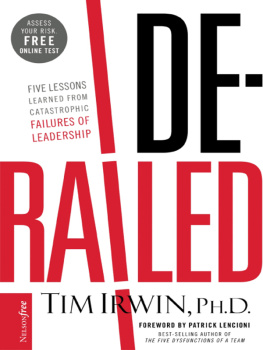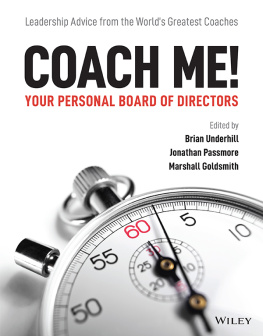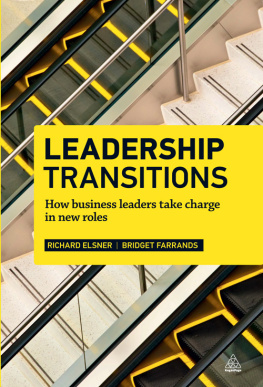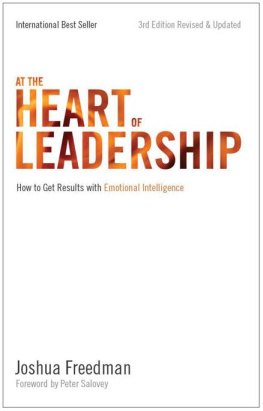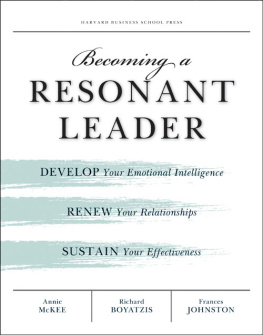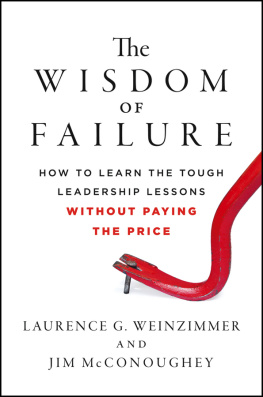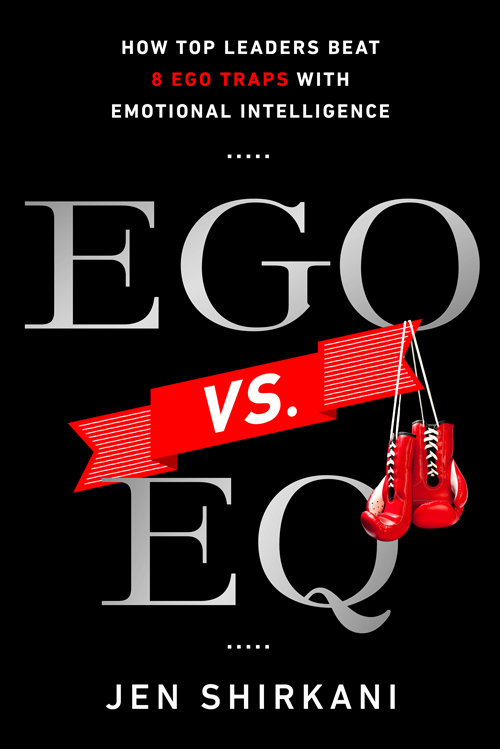First published by Bibliomotion, Inc.
33 Manchester Road
Brookline, MA 02446
Tel: 617-934-2427
www.bibliomotion.com
Copyright 2014 by Jennifer Shirkani
All rights reserved. No part of this publication may be reproduced in any manner whatsoever without written permission from the publisher, except in the case of brief quotations embodied in critical articles or reviews.
Library of Congress Cataloging-in-Publication Data
Shirkani, Jen.
Ego vs. EQ: how top leaders beat 8 ego traps with emotional intelligence / Jen Shirkani.
pages cm
ISBN 978-1-937134-76-1 (hardback) ISBN 978-1-937134-77-8 (ebook) ISBN 978-1-937134-78-5 (enhanced ebook)
1. ExecutivesPsychology. 2. Emotional intelligence. 3. ManagementPsychological aspects. 4. LeadershipPsychological aspects. I. Title.
HD38.2.S495 2013
658.4094dc23
2013020744
This book is dedicated to leaders everywhere who have the courage to look within.
I could never have accomplished this without the help of so many supporters.
My family: Steve, Caitlin, and Annie DeWaters, my parents: Jeff Shirkani and Nancy Martin, my sisters: Joy Shirkani-Monson and Dr. Kim Shirkhani.
My advisors: Faith Csikesz, Pamela Sumner, and Steve Calandro.
My support team: Suzanne Murray of Style Matters, Erika Heilman and Jill Friedlander of Bibliomotion, Marilyn Ellis and Jane Mata.
My muses: Thank you to all my amazing clients and colleagues whose generous vulnerability allowed me to share your stories with others. I have been privileged to be part of your journey and am so proud of each of you for your commitment and humility in becoming emotionally intelligent leaders. In particularNL, RM, JS, DB, TH, GG, RK, MS, BM, CS, SS, and MHthank you.
G etting the truth from others when you are in a position of power is tough. Its a tale as old as The Emperors New Clothes: No one wanted to tell the emperor he was naked, and no one wants to tell the CEO he might be wrong. Whatever the nature of the feedback for the leader, if its not purely positive, colleagues, employees, and peers may hesitate to offer it. That lack of candor can quickly lead to trouble: today, tomorrow, or in a few months time.
No matter how open minded or easy to talk to you may be, having a top executive role requires that you use diligent, mindful effort to stay grounded and in touch with how the decisions you make effect the people on the assembly line making widgets for you every day. Losing touch with the impact you have on others is quite common. And its inherent in the job. No leader is immune, even in a company with only five people.
Gary, for example, was a brilliant but aloof lawyer who rose through the ranks of his $3 billion company to the position of chief legal officer. When Gary served at lower positions in the company, his colleagues were able to tolerate his cold, impersonal naturehe had excellent technical skills so they were willing to overlook his gruff approach. Once at the post of CLO, however, Garys direct reportshigh-ranking lawyers themselveswere far less tolerant of Garys insensitive manner and weak interpersonal skills. In a matter of months, Garys direct reports declared virtual mutiny.
Then there was Jim, a likable CEO with an infectious laugh, who had a tendency to change directives to his team on a whim. Ten days before an internal conference, and after months of planning, Jim directed his senior operations team to bring in a new speaker for the eventa Navy Seal he had just heard on the radio and immediately wanted to hire. The team scrambled to secure the speaker, but the event itself fell flat because planning time ran short and the fit between the male, retired military speaker and the mostly female audience was a poor one. Worse yet, the operations team lost their motivation to work as diligently on future events, knowing that Jim might change the plan at a moments notice. Company morale and the overall success of the meeting suffered.
These are just two of the leaders who will be featured in this bookindividuals facing ego versus EQ challenges (more details on those terms later), challenges that could have cost them their jobs or their companys viability, especially over time. Its hard enough to climb to the top post in an organization or to build a business from the ground up; why make it more difficult to stay there by getting in ones own way? Thats what Gary and Jim were inadvertently doing, in spite of being solid businesspeople who brought many strengths to the table.
The Secret Ingredient: Emotional Intelligence
Although your experiences may not be exactly the same as those of Gary or Jim, these stories highlight some important questions every leader should ask. Whether you are an executive at a large company, VP of the division, or the owner of a small to medium enterprise, now that youve made it to the top, how do you stay there and thrive? How do you ensure growth and results over the long term? And how do you avoid the fate of so many other CEOs who have ultimately gotten fired and business owners whose enterprises have failed in the long run?
Anyone at the top of her organization shudders (if even just a little) when news breaks about a crisis that has occurred on another CEOs watch. Think of the BP oil spill off the coast of Florida, which released nearly 200 million gallons of oil between April and July of 2010.
No CEO or business owner wants to find himself in that kind of crisis situation, where his reputation is at stake and the future of his organization is put into question. But as we all know, bad things happen to good people and to perfectly good organizations every day. As unfair as it may sometimes be, in the end, theres often only one person who is held responsible: the CEO or business owner.
Lets be a little more optimistic, however, and assume that danger doesnt lurk around the corner for your job title or for your companys long-term security. Lets enjoy a moment in which things are, in fact, going swimmingly. In this fine situation, how do you nonetheless help yourself, your team, and the organization climb still higher? Even at the top, we all want to get a little bit better: to innovate again, to generate higher profits, to contribute to the industry in a meaningful way, and so on. Its your turn now, but how do you do it, not just once but continually?
The conclusion? IQ and technical skills are important, but they mean much less without EQ to back them up.
So if emotional intelligence is so vital to effective leadership, what does it really mean to possess this ability? Goleman defines emotional intelligence as The capacity for recognizing our own feelings and those of others, for motivating ourselves, for managing emotions well in ourselves and our relationships. In my own words, EQ is the demonstration of sensibility. It is a set of skills that includes the ability to recognize ones own impulses and moods, read situations and others accurately, and respond most appropriately, depending on the situation or person involved. Someone with high EQ can communicate with others effectively, can manage change well, is a good problem solver, uses humor to build rapport, has empathy for others, and remains optimistic even in the face of difficulty.
Now lets focus on how EQ looks specifically for individuals at the top of the organization. A leader with high EQ is not threatened by challenges from others, is easy to work with and for, and holds firm performance standards while also being seen as fair and trusting. Leaders with EQ also display situational awareness and emotional connectedness, two vital skills for building employee engagement. And employee engagement is what every executive wants. It is demonstrated by employees who go the extra mile, not because they have to but because they want to and


